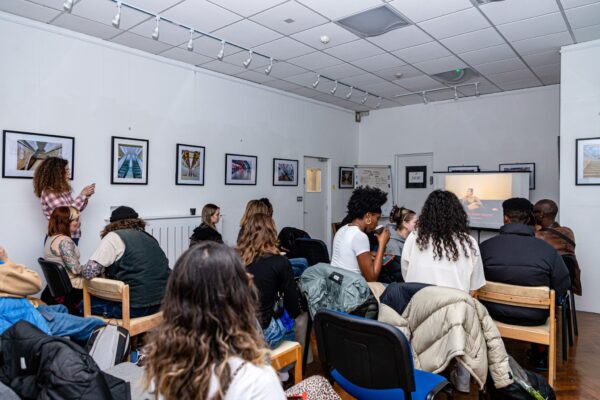
As part of Creative Newham‘s Cultural Producer programme Rosetta Arts has hosted photographer and budding cultural producer Kevin Audience for a placement with us to learn more about producing within our visual arts charity. As one of his final projects on placement, Kevin hosted a photography talk with photographer and designer, Jasmine Engel-Malone to celebrate Rosetta’s recent revamp of our darkroom. After putting on the event, Kevin said:
We were fortunate to have the film-centric Photographer, Jasmine Engel-Malone, join us for the event, which made the talk even more enjoyable and informative for the attendees. It’s always great to have engaged listeners, and she was able to capture their attention and keep them interested throughout the talk. Jasmine did an excellent job and all the hard work and preparation we did together paid off with a successful and memorable event. I would like to congratulate Jasmine on her beautiful work and talk. It was a fantastic experience having a sold-out crowd in our humble gallery.
Kevin on Photography Darkrooms
Photography darkrooms are an essential part of the photographic process, and there are several reasons why they remain important even in the digital age. Here are some reasons why you should consider the importance of darkrooms in photography:
Control: In a darkroom, the photographer has complete control over the entire process of developing the photograph. From the type of paper used to the chemicals used in the developing process, every aspect of the final image can be tailored to the photographer’s exact specifications. This level of control is simply not possible with digital photography.
Artistic expression: The darkroom offers photographers a unique opportunity to express their artistic vision. With the ability to manipulate the exposure and contrast of the image, photographers can create images that are truly unique and personalized. They can also experiment with different techniques like dodging and burning, which allow them to selectively lighten or darken specific areas of the image.
Craftsmanship: Working in a darkroom requires a high level of craftsmanship and skill. The process of developing a photograph is both delicate and precise, requiring the photographer to pay close attention to every detail. By mastering this craft, photographers can create images that are truly one-of-a-kind.
Preservation: Darkroom prints have been known to last for centuries, whereas digital prints may only last for a few decades. The traditional printing process uses archival materials that are designed to withstand the test of time, making them a valuable investment for photographers who are looking to preserve their work for future generations.
Tradition: Lastly, darkroom photography is a tradition that has been passed down for generations. Many photographers have spent countless hours in the darkroom perfecting their craft, and it remains an important part of the history of photography. By continuing to use darkrooms, photographers can keep this tradition alive and ensure that it is passed down to future generations.

